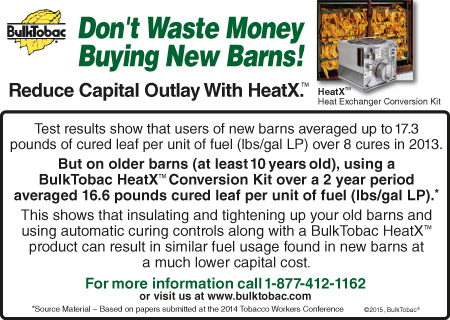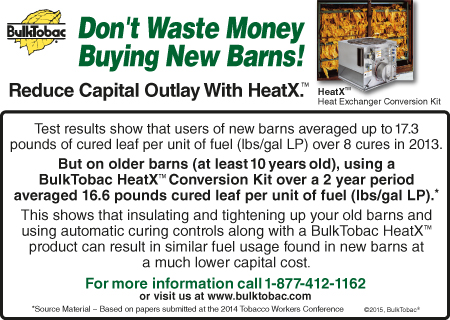SOUTHERN FARM SHOW EXHIBITORS
EXHIBITOR LISTINGS (TOBACCO
RELATED)
The Southern Farm Show takes place at the North Carolina State Fair February 5 through 7.
Jim Graham
Bldg.
· 222 Evans Mactavish Agricraft.
· 227 Kelley Mfg. Co. Agricultural equipment.
· 302
Hardee by
EVH Manufacturing Co. Sprayers.
· 704 (also 8131) Agri Supply. Agricultural materials.
·807 Mechanical Transplanter Co. Transplanters & seeding equipment.
·808 BulkTobac (Gas Fired Products). Curing equipment and controls.
Kerr Scott Bldg.
- 1002 TriEst Ag Group. Fumigation supplies.
- 1015 Yara North America. Fertility products.
- 1107 Flue Cured Tobacco Services. Curing controls.
- 1104 GoldLeaf Seed Co. Tobacco seed.
- 1120 BeltWide Inc. Transplant technology.
- 1115 Transplant Systems. Greenhouse systems.
- 1116 Cross Creek Seed. Tobacco seed.
- 1121 AAA Scale Co.
- 1201 Carolina Greenhouse & Soil Company.
- 1202 Reddick Equipment Company Inc. Manufacturer of spraying equipment.
- 1213 H&H Farm Machinery. “Building sprayers your way since 1978.”
- 1302 Mid-Atlantic Irrigation Co.
- 1415 Spapperi (Italy). Setters and other tobacco mechanization.
Exposition Bldg.
- 3127 (& 8611) Benchmark Buildings & Irrigation. Transplanters/irrigation.
- 3135 Southern Container Corporation of Wilson. Bale sheets and packaging.
- 3308 Tobacco Growers Association of N.C.
- 3311 Flame Engineering. Weed control with flame.
- 3520 First Products Inc. Fertilizer boxes for cultivators and tool bars.
- 3605 MarCo Mfg. Tobacco machinery.
- 3714 Suretrol Manufacturing. Curing Control.
Scott Tent
- 7025 Drexel Chemical Company. Sucker control chemicals.
- 7034 (&8012) Coastal AgroBusiness. A full-service agricultural solutions provider serving NC, SC, VA, ETN and NGA.
- 7302 Fairbanks Scales Inc.
- 7322 Transplant Systems. A growing system company.Tent 1
- 5029 AmeriGas Propane. One stop shop for all propane needs.
- 7334 BJ Williamson Greenhouses.
Outdoors
- 8039 Vause Equipment Co. Farm equipment.
- 8208 Wilson Manufacturing. Farm trailers.
- 8204 Equipmax. Tobacco spray equipment.
- 8217 Granville Equipment. Tobacco and Hemp Machinery.
- 8301 De Cloet SRL. Tobacco machinery.
- 8510 Walters Air Assist Plant Release System. Plant release system.
- 8516 Mobilift of Burlington, N.C. Forklift sales and service.
- 8546 {& 227) Kelley Mfg. Co. Agricultural equipment.

 weather
weather

 frustration with the operation of the Tobacco GAP program among farmers, some of whom see no tangible return to the grower who complies with the program. "They see instances of GAP - certified farmers who lose their con-tracts while some farmers who are not compliant with GAP stay in business," he said. Excellence is the goal: It is hard to maintain morale in this situation, he said. "GAP should reward excellence," he added.
frustration with the operation of the Tobacco GAP program among farmers, some of whom see no tangible return to the grower who complies with the program. "They see instances of GAP - certified farmers who lose their con-tracts while some farmers who are not compliant with GAP stay in business," he said. Excellence is the goal: It is hard to maintain morale in this situation, he said. "GAP should reward excellence," he added.
